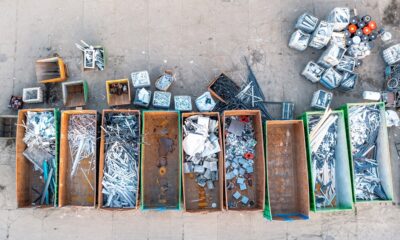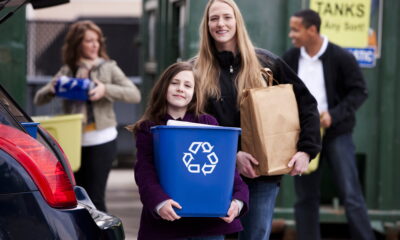

Energy
How Are Batteries Recycled? It Depends On Which Kind You’re Recycling
There are many people who ask, “Can you recycle batteries?” or “How are batteries recycled?” The answer is that you can recycle all types of batteries. Before you recycle your batteries, you should know more about the recycling process that each of the major chemical components will go through. This will help you understand why you should look at recycling instead of placing the batteries in the landfill.
The Lead Acid
When recycled, the battery will be broken down in a hammer mill. This is a machine which hammers the battery into its various pieces. The broken battery will then be placed into a vat where lead and other heavy metals will fall to the bottom and the plastic sections of the battery will float to the top.
At this point, the liquid will be drawn off and all of the polypropylene pieces will be scooped away. This will leave the heavy metals and lead in the vat. Each of these materials will go to a different recycling stream in the overall recycling process.
The Plastic
The plastic or polypropylene pieces of the battery will be washed and blown dry. They will then be sent to a plastic recycler where all of the pieces are melted together and reduced to a liquid state. The molten plastic is then put into an extruder which makes small plastic pellets which are all the same size. These plastic pellets are then used in the manufacturing process of new battery cases and the whole process will start again.
The Lea
All the lead parts of the battery including the lead oxide and lead grids will be cleaned and heated in smelting furnaces. When the metal is a molten liquid, it will be poured into ingot molds. While in these molds, the impurities in the liquid will float to the top.
These impurities are then scraped from the top of the metal and the ingot will be left to cool down. When the metal is cool, it will be removed from the molds and sent back to the battery factories. There the metal will be melted down again and used to make new batteries.
The Sulfuric Acid
There are two ways that old battery acid can be recycled. The first is through the neutralization of the acid with an industrial compound which is similar to baking soda. This process will turn the acid into water which can then be treated, cleaned and tested in a water treatment plant to ensure that it meets all of the safe water standards.
The second process will be to have the acid processed and converted into sodium sulfate. This is an odorless white powder which is commonly used in glass and textile manufacturing as well as laundry detergents. It is important to note that lead acid batteries have a closed loop recycling process which means that every part of the old battery will be recycled into the new battery. It is estimated that around 98% of all lead batteries are recycled.
Alkaline Batteries
Alkaline batteries such as AA and AAA batteries can also be recycled. To separate the parts of the battery a special room temperature mechanical process is used. The components of the battery will then be separated into various end products.
The first is the zinc and manganese concentrate. The other parts include the plastic, brass fractions, steel, and paper. All of these compounds will be put back into the battery market to be reused for new batteries. This will offset the recycling cost and alkaline batteries are 100% recycled.
Lithium-Ion Batteries
To recycle lithium-ion batteries a special process known as room temperature, oxygen-free mechanical process will need to be used. As with other recycling processes, this will separate the battery into different parts and there are 3 that will be created. The first is the cobalt and lithium salt concentrated, the second is the copper, aluminum, and plastic with the third being the stainless steel. All of these products will be placed back into the manufacturing line and be reused to create new products. It is possible for these batteries to be 100% recycled.
Nickel-Cadmium Batteries
When these batteries are recycled, the plastic will be separated from the metal components before the actual recycling process. The metal will then be recycled using high-temperature metal reclamation. This is a process where all of the metals contained within the battery such as nickel, iron, and chromium will be placed in a molten metal bath within the furnace.
During this process, the metals will amalgamate then solidify in a casting operation. There are some low-melt metals in the mixture which will be separated during the metal. The metals and plastic will then be returned to factories to be reused in new products. These batteries are 100% recycled.
Nickel Metal Hydride Batteries
The cell portion of the battery will be separated from the plastic before the recycling process starts. The cells will then be placed in a drying process which removes all of the moisture from them. This process heats the cells in a temperature and time controlled manner.
Once the cells have been dried, they will become feedstock for stainless steel as well as alloys. The plastic and metals will then be placed on the market for use in new products. These batteries can be 100% recycled.
Lithium Batteries
These batteries will be exposed using a shredder or a hammer depending on the size of the battery. The contents are then placed in caustic water which will neutralize the electrolytes. The metals will then be recovered and cleaned to be sold to metal recyclers. The water solution will then be filtered.
The carbon which is recovered will be pressed into sheets to make carbon cake while some of it will be recycled with cobalt. The lithium solution it the battery will be converted into lithium carbonate which is used for ingot metal as well as foil batteries.
Mercury Batteries
These batteries will be recycled using a controlled temperature process. It is important to note that the number of these batteries on the market has decreased since laws were passed limiting the use of mercury. These laws have made the sale of mercury-containing batteries illegal in parts of the United States.
If you need any more details on how to dispose of batteries, this is a more in-depth guide.


 Environment12 months ago
Environment12 months agoAre Polymer Banknotes: an Eco-Friendly Trend or a Groundswell?

 Features11 months ago
Features11 months agoEco-Friendly Cryptocurrencies: Sustainable Investment Choices

 Features12 months ago
Features12 months agoEco-Friendly Crypto Traders Must Find the Right Exchange

 Energy11 months ago
Energy11 months agoThe Growing Role of Solar Panels in Ireland’s Energy Future




























